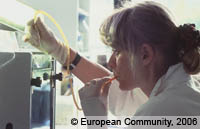Women scientists on the increase, but missing in business, finds report
The European Commission has published its latest figures on the participation of women in science, confirming that while numbers are increasing, a significant gender imbalance persists. The 'She Figures 2006' booklet gives an overview of the situation in 2004 for women in science, providing data on specific gender differences across employment sectors, education subjects and levels, and examining the extent of the contribution that women make to setting the scientific agenda. The report is the second in a series and provides several sets of additional data to 'She Figures 2003', including new statistics on the gender-pay gap in selected business sectors. In 2004, the percentage of women graduating at PhD/Doctorate level in the EU-25 stood at 43 per cent, an improvement on the situation in 1999, when the EU average was 38 per cent. It is also encouraging to note that this increase happened at a rate higher than that of men - seven per cent compared to two per cent among men. However, while the overall growth in the number of female graduates looks promising, the data for the percentage of women employed as scientists and engineers rings alarm bells. In 2004, women accounted for 44 per cent of the total EU labour force, and between 1998 and 2004 their participation rate had risen faster than that of men. In contrast, women made up only 29 per cent of those employed as scientists and engineers, with the growth rate in their participation rate between 1998 and 2004 increasing much more slowly than that of men: 0.3 per cent for women compared to two per cent for men. In terms of women's presence across the sectors of the European economy, the report reveals that the proportion of female researchers working in business and enterprise stood at a paltry 18 per cent in 2003 - an increase of only one per cent since 1999. These are worrying figures, says the report, considering that business is the largest research and development (R&D) sector in most countries, and one that will need to provide two-thirds of the finance to meet the EU target of three per cent GDP devoted to R&D by 2010. Reaching the target would also require 700,000 additional researchers. A deficit can also be seen in the number of women in senior positions, with only 15 per cent of the total 35 per cent of women in higher education occupying the highest academic grade. In the case of R&D, the report finds that a smaller proportion of women are employed at the researcher level than is the case with men; and yet at the two lower levels of 'technician' and 'other', the situation is reversed. This trend, the report says, begs the question of whether women are opting for occupations for which they are in fact over-qualified, perhaps as a trade-off that enables them to juggle the work-life balance. The report concludes by examining women's contribution to setting the scientific agenda. It finds that, in terms of access to funding, men generally have much higher success rates than women in obtaining financial support. Other discrepancies are found regarding scientific board membership: of the 17 countries that provided data on this subject, only two reported female proportionality on boards that surpassed 40 per cent, with one in the range of 30 to 39 per cent; five in the range of 20 to 29 per cent, and the remaining all below 20 per cent. On a more positive note, the report finds that the gender-pay gap has slightly decreased over time to 15 per cent, but notes that this overall EU figure masks greater variations in individual Member States. She Figures 2006 and the findings of the report 'Women in Science and Technology - the business perspective' are central to discussions underway at a conference organised by the Austrian Presidency and the Commission, entitled, 'Researching Women in Science and Technology', taking place in Vienna, Austria, on 15 and 16 May.

